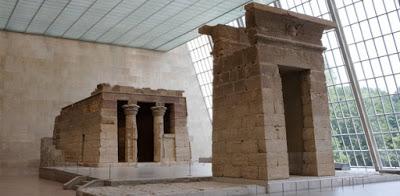Arvo Pärt's 80th Birthday: Sept. 11, 2015.
by Paul J. Pelkonen
(My apologies to you the reader for the relative lateness of this post. It proved very difficult to write. Normal service will resume shortly.)

The Temple of Dendur in the Sackler Wing of the Metropolitan Museum of Art.
Photo © 2015 The Metropolitan Museum of Art.
It was with some relief that I learned that the Met Museum would be offering a concert that evening: a chamber performance by the New Juilliard Ensemble under the direction of Joel Sachs. On the bill: an hour and a half of major chamber, piano and voice works by Arvo Pärt. The concert was being held in conjunction with Mr. Pärt's 80th birthday at the Temple of Dendur, the glass-enclosed Egyptian temple and gate that stands on the north side of the massive museum. Keeping in mind what day it was, I asked the Met press office for a museum pass along with my ticket.
The Met is a huge place, and one that I can navigate pretty well without a map. I took myself on a tour, trying to touch serenity and inner peace at different locations. I sat in front of the water stone in the Japanese Art gallery for about half an hour. I went to Musical Instruments and the Frank Lloyd Wright room. I visited the wing dedicated to Islamic Art, and the replica of a Damascus living room and a huge Ottoman rug, exhibits that seem off the beaten path in this huge museum. I stopped to see Jackson Pollock's Autumn Rhythm, a huge and chaotic painting that speaks to me. And then I headed north again to the Temple, walking through the Old Kingdom exhibit to the glass doors of the Sackler Wing.
The setting for these performances was the vast granite surface in front of the Temple gate, surrounded by fountains and seating on the usual utilitarian white folding chairs. Light stanchions and speakers had been added, with the amplification in place to aid the performers in the difficult and boomy acoustic of the Sackler Wing. The sound was clear and even lush, with the opening string quartet arrangement Fratres blooming in its complex, repeated lines.
The concert then shifted to a series of works for piano and violin, solo keyboard and piano and 'cello, accompanied on occasion by a determined and surprisingly talented cricket that had somehow entered the hermetically sealed space of the Temple. This little visitor from Central Park added some much-needed life to the sterile environment, and some musical levity to pieces that while beautiful, were mostly sere and somber.
Some needed energy came in the form of "Spiegel im Spiegel", which featured a virtuoso pairing of the cello and piano, chasing each other and slaloming through complicated downhill slopes of notes. The concert also features songs: Mr. Pärt's Wallfahrtslied (sung by baritone Christopher Dylan Herbert) and a stretched-out take on "My Heart's in the Highlands." The choice of the Robert Burns poem seemed anachronistic, especially as sung by Jacqueline Horner-Kwiatek, but perhaps that was the composer's intent.
The cricket continued, determined but seemed to hush for a repetition of Fratres, this time arranged for violin and piano and set as the choreography for two lithe dancers. Moving together in increasingly gymnastic and complex contortions and sexless in their dance attire, they seemed to be two sacerdotes re-consecrating the Temple after long disuse as a museum exhibit. On this, the strangest day of Manhattan's calendar year, the image provided something of a quantum of solace.

